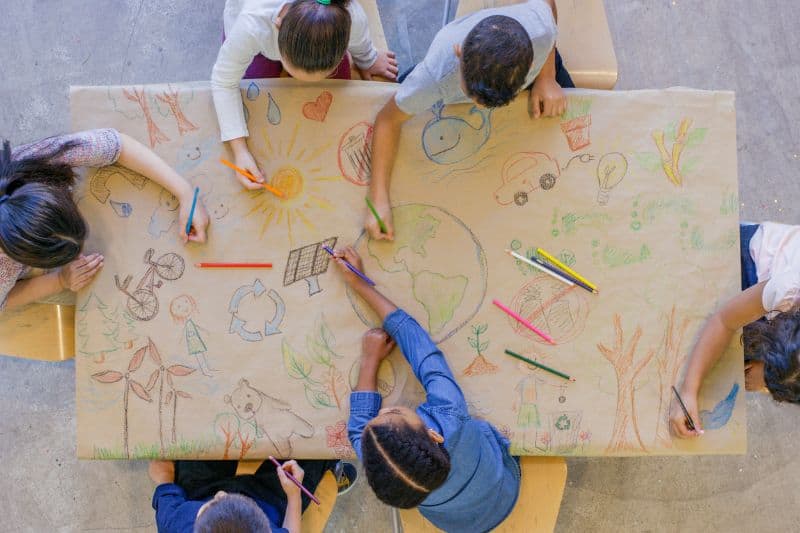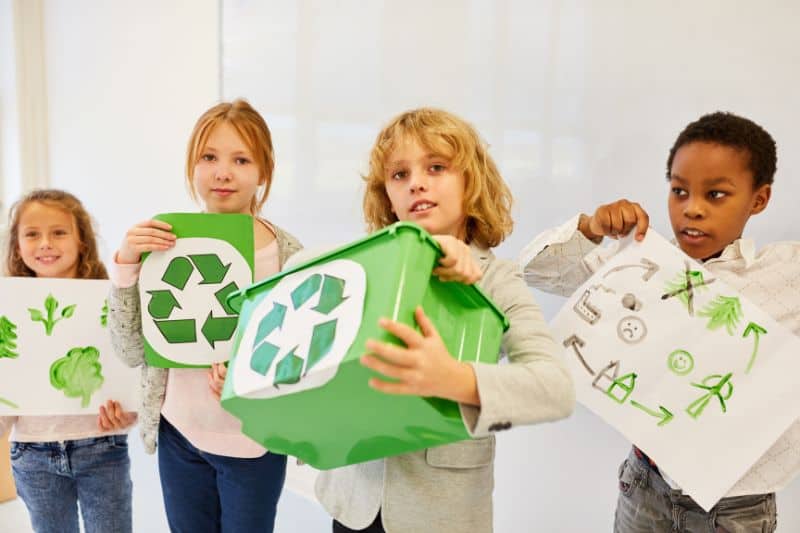Environmental Education (EE) is a methodology through which individuals familiarize themselves with their surroundings, acquiring the necessary knowledge, skills, values, experiences, and motivation to act — separately and aggregately — in caring for present and future environmental issues.
In simpler terms, you can think of it as the study of relationships and interactions between natural and human systems.
Environmental education is provided so that people can better understand the world around them and know how to take care of it properly so that the world can be a better place.
According to EPA,
Environmental education is a process that allows individuals to explore environmental issues, engage in problem-solving, and take action to improve the environment. As a result, individuals develop a deeper understanding of environmental issues and have the skills to make informed and responsible decisions.
Environmental education is a complex field, and it covers various topics related to the environment. It even has some aspects of engineering in it, which means that a person can even start to understand how they can play a role in environmental engineering.
Environmental education furnishes individuals with the mindfulness required to build up organizations, comprehend NGO exercises, create participatory methodologies for urban planning, and guarantee future markets for eco-business.
All of these are not only good for the environment, but they will also end up being very good for the economy as well, so everyone gets to benefit from the efforts of those going through environmental education. EE is taught in schools, communities, and centers like parks, zoos, and museums.

Features of Environmental Education (EE)
Some of the main features of environmental education are:
- It is a learning process that expands individuals’ information and mindfulness about nature’s domain and related difficulties, creates the vital abilities and mastery to address the difficulties, instills confidence and stewardship, and cultivates demeanor, inspirations, and responsibilities to settle on educated choices and make dependable moves in the field that they are working with.
- It is an interdisciplinary field. It integrates fields such as biology, ecology, earth science, geography, atmospheric science, and mathematics because understanding how the environment works and keeping it healthy requires knowledge and skills from many disciplines.
- It includes all efforts to make the general public aware of the environment and environmental challenges. These efforts utilize print materials, media, brochures, bulletins, videos, or other media techniques.
- Leads to responsible individual and group actions.
- EE provides information about specific environmental concerns or problems to the general public. In other words, it doesn’t target specific groups, religions, or communities.
- EE works to help you think critically so that you aren’t sitting there trying to fit everything into a neat little box.
- EE relies on scientific data. It involves students in different data-gathering techniques that help them to discuss, analyze, predict, and interpret data about environmental issues.
- It is study-centered. It promotes higher-level thinking skills and is relevant to student’s everyday lives.
- EE allows people to discuss complex environmental problems without simple answers.
- It is a process in which individuals gain information about environmental awareness and acquire knowledge, skills, values, experiences, and determination to help them solve different environmental problems.
- Environmental education is a holistic subject, and the development of a student can be best ensured if enough scope is given to them to apply the learned principles in real life.
- It is a subject that involves a lifelong process. Since the environment is constantly evolving with every passing day or year, Environmental Education also has to improve and develop to keep up the pace so it can eventually help the environment a little better.
- Just as its name suggests, EE is not merely a theoretical aspect. It is an education as a whole. In fact, in the truest sense, EE is a holistic approach to education.
- It considers all the aspects of the environment. From the social, the political, the economic, the aesthetic, the spiritual, as well as the moral. No environmental aspect is too minor to be considered. It saves and protects the environment as and when required.
- It has high adaptability. In other words, as the environment changes, certain principles of this subject could adapt and evolve to support the change. Environmental Education is and will always be there for the environment.
- Environmental Education has many dimensions. It can be considered in the past, the present, as well as the future. It can be both local as well as global. Environmental Education has no such geographical boundaries to limit it.
- Environmental Education is a subject that encourages a healthy relationship between human beings and all the other elements of nature. It works on the belief that developing an organic relationship between human beings and all other natural elements is necessary to encourage the development of a sustainable environment.
- Environmental ethics are always at the forefront of this subject. This subject prioritizes the ethical treatment of every element regardless of its size.
- EE encourages the active participation of everybody. Only through everybody’s involvement can we serve the environment better.

Passion for safeguarding the environment can drive individuals to apply their education effectively, fostering a commitment to environmental care as they build their companies or organizations.
Environmental instruction upgrades basic analysis, critical thinking, and compelling choice-making abilities, instructing people to weigh different sides of an environmental issue to settle on educated and capable choices.
Environmental education does not advocate a specific perspective or game plan; instead, it allows you to make your own choices on how you can take better care of the environment.
In short, it will help you look at any situation that you may be in, and it will assist you in being able to make a decision that is beneficial for the environment.
With a background in environmental education, you will have the environment at the forefront of your mind, so whatever plan you end up making, you will be able to adapt it so that it is more environmentally friendly and savvy.
Components of Environmental Education
There are a number of different parts of environmental education. The most common segments of environmental education that you will come across during your studies can include the following:
- Awareness and Mindfulness: Being mindful and sensitive to the natural environment and its challenges is crucial, especially in today’s corporate sector.
- Knowledge and Learning: It incorporates learning and understanding nature and environmental difficulties holding people back and/or causing the world to change negatively.
- Attitudes: Disposition of sympathy toward nature’s domain and inspiration to enhance or keep up the environmental quality, which will spill over into any plans you make or anything else you do that is related to the organization you currently are working in or developing.
- Skills: Aptitudes to recognize and help resolve environmental difficulties in a practical manner that matches up with the current trends and technologies that are out there today.
- Participation: Investment in programs and projects that help reduce the effect of environmental difficulties, thereby making sure that the money you’re investing is going to help the environment instead of harming it.
- Promotion of Green Facilities: It involves making green initiatives popular and providing the required infrastructure to help develop several environmental aspects. The promotion of green facilities like a self-sustainable kitchen or even a self-sustaining school could be promoted to boost awareness among the public as well as to help with the promotion of better environmental relationships.

So, environmental education is actually an incredibly important part of running a business, company, or organization. Without this vital component, companies would be a lot more reckless with natural resources and/or the land that they are using in order to move their company forward.
It empowers an individual, community, organization to enhance their decision-making skills by weighing various sides of an issue and not advocating a particular viewpoint or action.
With environmental education, you can be sure that your staff will be more mindful of the environment around them and that they will be savvier when it comes to making plans that are more environmentally friendly and beneficial.






